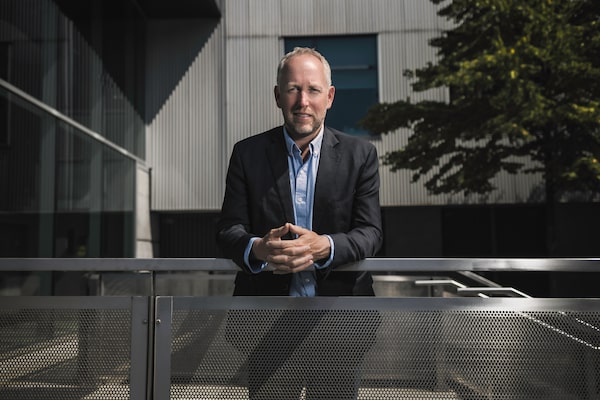
SemiosBio CEO and founder Michael Gilbert. SemiosBio is a specialist in 'precision farming' technology that helps guide farming decisions.Supplied
Vancouver’s SemiosBio Technologies Inc. is set to become the world’s largest independent agriculture technology company after agreeing to buy Australia’s Agworld Pty Ltd. for more than $100-million.
With the acquisition – its third since early June – Semios, a specialist in “precision farming” technology that helps guide farming decisions, expands well beyond its core business of serving fruit and nut operations primarily in California and the Pacific Northwest. It’s expected the combined company will generate $65-million to $75-million in annual revenue, employ 300 people and serve farmers with more than 100 million acres under management in North America, Oceania, Europe and South Africa.
The deal makes Semios the largest independent provider of “agtech” used by farmers to generate data, guide decisions and improve yields, rivalling Climate Corp. and Granular Inc. owned by chemical giants Monsanto Co. and DuPont de Nemours Inc., respectively.
“A lot of our customers are more trusting of data that’s independent of chemical suppliers,” said Michael Gilbert, chief executive officer of Semios. “That’s the play here. We’re now shoulder to shoulder with the biggest agriculture companies in the world. This is Canada stepping up and owning a space like this.”
Mr. Gilbert said he’s is in talks for further acquisitions and can access more than $100-million in fresh capital from investors, including private equity firm Morningside Group – which led a $102-million investment in Semios last year – if needed. “I have zero concern” about accessing financing, he said. “It’s about finding the right companies to build the platform. There’s an imminent race here to build the platform and we don’t intend on losing this race.”
He anticipates Semios will reach US$100-million in annual revenues within two years, at which point it may go public.
Semios is one of several Canadian companies, including Farmers Edge Inc. and Telus Corp. , looking to digitize the global agriculture business.
The adoption of connected technology by the agriculture sector is set to bring significant changes to the industry, said Steve Hansen, an agriculture equities analyst with Raymond James. Buying Agworld, he said, “is a transformational deal for Semios. It has predominantly been a North American company. This deal broadens their capability set, extends their reach into other regions and gives them an ability to cross-sell their core product.”
Semios, founded in 2010 by Mr. Gilbert, established itself in recent years as one of the top emerging technology providers to farmers, using wireless technology and a chemistry trick to prevent the spread of damaging insects for high-value crops such as almonds, lemons, grapes, apples and pistachios.
Its signature offering is bug-control technology aimed at reducing the use of insecticides. Put another way, instead of spraying to kill the bugs, one sprays to fool the bugs. At the heart of its product are synthesized chemicals that mimic pheromones, natural chemical signals that pests send out to one another. Semios’s simulated pheromones are sprayed at controlled intervals from canisters mounted in orchards and vineyards to confuse male insects, which fly into a fog of phony pheromones looking for females, only to perish before propagating. The company sells its systems on a subscription basis, meaning farmers don’t have to lay out huge sums for technology they have to replace at their own cost when it becomes obsolete.
Mr. Gilbert said his clients told him they were tired of dealing with multiple startups that help them collect data and guide decisions on farm conditions such as insects, soil moisture and air temperature. Instead, they encouraged him to buy the smaller players up so they could deal with fewer suppliers and get a more integrated offering. “Our customers get propositioned by so many five-man shop companies,” Mr. Gilbert said. “Farmers will try it but then ask, ‘Will you be around in a year?’ They don’t have a lot of time for that. They’d like to see us vet these companies and vend them in.”
Neal Carter, a long-time Semios customer, was one of those advocates. “I told Michael, ‘What you really need to do is integrate these things so there’s one dashboard that provides us with all the answers so we can use precision data to drive more of our operations,’” he said. “I’m pretty excited by what he’s has been able to accomplish.”
So Semios, which is profitable on an operating basis, earmarked some of the capital it raised last year for a mergers and acquisition strategy. The company delayed its move into deal-making because of the pandemic, announcing its first acquisition in June for San Francisco-based Altrac, which makes control systems that turn on wind machines that prevent against frost damage in farmers’ fields. Later that month Semios bought Wenatchee, Wash.-based Centricity, which helps farmers manage data around compliance and traceability to show what inputs went into crop production. It paid less than US$15-million, combined, for the pair.
With Agworld, Semios is picking up a provider of enterprise resource planning software with about $10-million in annual revenues used by farmers mostly in the United States and Britain. “Agworld helps plan for the year, and then we help execute on the plan” with Semios’s other offerings, Mr. Gilbert said. “It become essentially a full-year, full crops cycle management system.” Semios is paying for the deal with a mix of cash and stock.
Your time is valuable. Have the Top Business Headlines newsletter conveniently delivered to your inbox in the morning or evening. Sign up today.